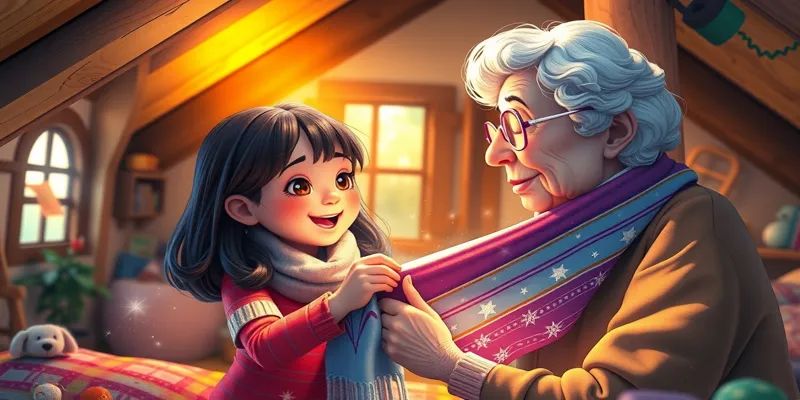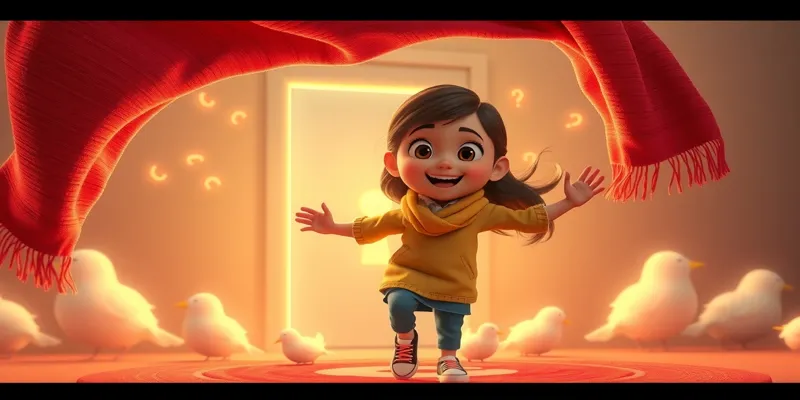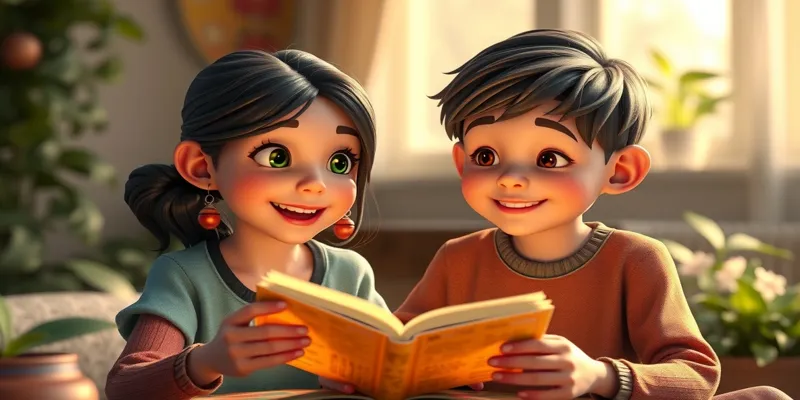
Maya and the Listening Scarf Doors for Open Hearts Afield
Maya found the scarf wrapped in tissue paper at the very back of her grandmother’s attic. It shimmered even in the dust dim light, threads the color of dawn and twilight woven over and under like small rivers. She lifted it and felt the strange, cool hush that happens right before you learn something important. Along the border of the scarf were tiny stitched constellations and a sentence so small she had to squint to read it: For travelers whose hearts are open.
“I just want something interesting to happen,” Maya whispered. It had been a summer of spelling lists and chores, of the same walk past the same pebbled wall to the shoreline, where the tide meshed the bay like clockwork. She loved her grandmother, who smelled like cinnamon and told stories of the stars, but the days were beginning to taste like the same old cereal.
She wrapped the scarf around her shoulders. It felt like the way a library feels: quiet but alive. The attic windows trembled as if a soft wind had knocked politely. The scarf lifted once, twice, and unfurled with a whisper that sounded like pages turning. The dust motes in the air became bright, then brighter, and then they were not dust but tiny birds made of commas and quotation marks, fluttering in a stream toward a door that had never been there before. The door was made of light, and the keyhole was a star. The scarf tugged.
“Well,” Maya said, and stepped through.
She came into a valley of books large as barns, their pages spread open to the sun. Letters coiled between them like vines, and punctuation marks hopped like tiny hares. The air smelled faintly of ink and peppermints. A woman with hair like spilled ink glided from behind a hill of paper and bowed. “Welcome to the Valley of Echoing Books,” she said, her voice a gentle punctuation. “I am the Librarian.”
“What’s wrong?” Maya asked, because something felt wrong. The pages in the valley fluttered uncomfortably. Sentences stopped and started. The birds made of commas were nesting in a half finished paragraph.
“Endings,” the Librarian said. “They have slipped away. People grew bored and began to skip to the last page. The endings felt unwanted and walked off. Now the beginnings ask: How will I know who I am?”

Maya went to the nearest book and read the first line aloud: “On a day so windy even the teapots flew, Arno laced his boots.” She turned to a nearby ending and read: “Under the quiet, the seeds dreamed, and when spring came, they remembered the stars.” It felt right, somehow. She was not sure why. She read another beginning: “Eliza carried a small moon in her pocket and refused to share.” She held it next to an ending: “He learned that doors open when you ask, and shut when you demand.” Not right. She tried another: “The moon had been a mirror all along, teaching them to light each other.” That felt like the end of Eliza’s story.
“Go on,” the Librarian urged. “Match them. But read, really read. Don’t rush.”
At first Maya grabbed at the closest endings, trying to force matches like puzzle pieces at the wrong angle. The scarf, which had hung at her shoulders like friendly fog, tightened a little. She stopped. In the far field, she noticed a boy with a paper face and ink stained fingers watching her. He had the fragile look of something folded many times.
“What’s your story?” she asked him.
“I don’t know yet,” he answered. “Everyone keeps telling me their favorite ending, and it keeps slipping off me.”
Maya sat on the soft spine of an atlas and patted the space beside her. “Tell me your beginning,” she said. He did. He talked about wanting to leave his small page, how he ran to the edge only to find them blank until he drew in the borders himself. The more he talked, the more his edges firmed up. The more she listened, the warmer the scarf felt at her neck.
“Your ending,” she said slowly, “isn’t about finding a bigger book. It’s about realizing you can write inside any margin.” She found an ending that said, “He learned that the walls he feared were made of paper, and paper takes ink.” The ending settled on him like a coat and changed color at his throat. He beamed. Pages fluttered in the valley, settling where they belonged. Matching the last one, Maya felt the scarf glow.

“Thank you,” the Librarian said, and something loosened in the valley, a sigh like relief. “It seems you know how to listen to stories.”
“I’m learning,” Maya said, because she was. The scarf tugged again, and when she turned, the valley had narrowed into a hallway of books. The door of light stood at the end, the star shaped keyhole bright and patient.
On the other side was a city built of water and brass. Canals ran in precise patterns, and the bridges over them were made of gears that clicked and spun as if the whole town were a clock. People in copper aprons moved to the rhythm of chimes. The air smelled like salt and tin. But the water in the canals had gone still, glimmering like a held breath, and the clocks on the towers were pointing to different times.
“Welcome to the City of Clockwork Tides,” said a woman with weather creased eyes and a hat decorated with little metal fish. “We’re tide keepers. The gears that lift the gates in our canals follow the tide. But the tide is late.”
“Tides don’t get late,” Maya said, remembering how her grandmother talked about the moon pulling at the water with a silver rope. “The moon keeps time for the oceans.”
“The gears don’t,” the woman grimaced. “We’re not all keeping the same beat. The east tower wants to be early so it can open first. The west tower won’t move until noon because it eats lunch at odd hours.”
Maya climbed a stair that spiraled up the inside of a clock tower. From the top, she could see the city like a pattern of ripples. She cupped her hands and shouted, “When do you think high tide is?” The people in the east shouted, “Now!” The people in the west shouted, “Later!” The people in between argued about quintets and quarter hours. It made a splendid noise that solved nothing.

“Okay,” Maya said to the hat woman. “What makes good rhythm?”
“Listening,” the woman admitted. “And keeping a steady count.”
Maya closed her eyes and remembered the beach. She remembered the way waves rolled, counting softly to themselves: four in, four out. She counted aloud. The scarf lay warm against her back. “We’ll start together. On my four, we all set our clocks to noon. Then we’ll adjust by one, two, three chimes depending on how far you are.” She drew numbers in the air so that everyone could see the plan. It felt like math and music holding hands.
They tried once. Then again. The third time, something clicked, literally and metaphorically. The east tower gave up being first in favor of being on time. The west tower stopped munching and set its lunch aside. The whole city moved at once, the gears lowering gates, the canals taking in water like breath. The tide came, not late at all, only waiting for the city to learn its own timing.
“You have a good ear,” said the hat woman, pressing a coin into Maya’s palm, stamped with a tiny moon surrounded by gears. “You listened to water, and to people.”
“I’m practicing,” Maya said. The scarf, full of the smell of salt and sun warm metal, tugged again.
They came into a forest where every leaf whispered. The trees were tall and their bark patterned like fingerprints. A fox with silver paws darted across the path, stopped, and looked at Maya with eyes like polished amber. It opened its mouth and said in a human voice, “I am hungry. I am hungry. I am hungry.”

“Okay,” Maya said, startled. “Um.”
A squirrel on the branch above chattered “Hungry,” back to her. A bird on the next tree said, “Hungry,” in the exact same voice. Even the glimmering insects seemed to hum it, like a chorus stuck on one word.
A woman with moss in her hair appeared. “Forest of Borrowed Voices,” she said. “The trees and creatures can echo, but they can’t originate. We talk, they repeat. We grew used to speaking for them. Now we can’t hear what they mean, and we fear we’re missing something.”
The fox tugged at Maya’s shoelace. “I am hungry,” it said again and again. Its breath smelled like crushed leaves.
“Show me,” Maya said, crouching. “Show me what you’re hungry for.”
The fox turned and slipped into the trees. Maya followed, but carefully, looking where the fox looked, watching how it paused to sniff one bush and not another. She resisted the urge to fill the forest with guesses. She simply watched, stepping where the fox’s feet made no sound. At a tangle of thorn and vine, the fox pressed its nose to a gap and whined. A thin, high answering note came from inside: a kit. The thorns were sharp, but the vines could be unwound if you understood their pattern.
Maya reached for a long stick and traced the spiral of the vines. “It curls clockwise,” she murmured. She unwound one coil, then another, and the fox watched with trembling patience. The kit popped out eyes bright as new pennies and tumbled into her mother’s fur. The forest breathed. The whispers turned for a moment into something like laughter. Even the trees made a creak that sounded like relief.

“You listened with your eyes,” the moss haired woman said. “You asked a better question instead of a louder one.”
Maya hugged her knees. “I used to think that learning was mostly answering,” she admitted. “But it’s also asking.”
The scarf kissed her cheek like a moth. The whisper of its threads had a word hidden in it: Ready.
Maya walked on, and the next place was a mountain of light and shadow. The path across it was ribbon thin and only visible in her peripheral vision, like the way you can sometimes see a star better if you don’t look straight at it. When she stared, it vanished. When she softened her eyes and breathed slow, it glowed.
On a rock beside the path rested a moth with smoky wings, patterns like maps written in fog. “You’re afraid,” it said, not unkindly.
“Terrified,” Maya answered, because lying seemed dangerous here. “What if I misstep? What if I can’t find the next place?”
The moth flicked its wings. “We don’t fly at the sun,” it said. “We take our cues from the quiet light. We are not ashamed of the dark that teaches us.”

Maya let that into her chest. She didn’t scold her fear or argue with it. She let it ride along, like a kitten you don’t want to drop. The path brightened. She walked carefully, discovering that balance is easier when you admit it is a skill and not a guarantee. At the far edge, she came to a gate made of woven questions: Why and How and Who and When, laced into a lattice.
Behind it buzzed a market, stalls pulsing with possibility. People bartered for ideas. A woman traded a map of the wind for a recipe for rain. A child swapped a broken compass for a story about finding your way without one. But a shadowed figure moved through the crowd collecting question marks and putting them in glass jars. “I like things neat,” he said to a vendor who protested. “Questions mess up the aisles.”
“You can’t put questions in jars,” Maya said. “They suffocate.”
He glared. “You’re new. You don’t make the rules here.”
The scarf lifted like a bright banner above her. The questions in the lattice gate trembled, and some slipped free to hover around her head like curious fireflies. They smelled like fresh paper and rain.
“What do you trade?” the shadowed figure asked, eyeing the scarf. “That cloth is worth an answer to any question.”
Maya touched the scarf. It had brought her through books and gears and trees and shadows. It had shown her the tide’s count and how to watch a fox. It was woven through now with the best kind of knowledge the kind you can share. She took a breath. “I’ll give you the scarf,” she said slowly, “if you let the questions go. All of them.”

The market went silent. The moth fluttered to her shoulder like a promise. The scarf warmed once and then lay still, as if waiting to see what she would choose.
The shadowed figure lifted the jars. He hesitated. He seemed to want very much to keep the aisles neat. But he wanted the scarf more. He set the jars down. She could hear the questions bumping the glass like little hearts. He opened one jar, then another. The questions flowed out, bright and unruly, asking all at once: Why can’t we? How might we? What if? They rose over the market like a murmuration of starlings and swooped into people’s ears, perched on shoulders, and dove into pockets.
Maya unwrapped the scarf. It felt suddenly very heavy in her hands. She folded it and held it out. “Wait,” she said. “I have one condition. It only works if you promise to treat it like a bridge, not a wall. Use it to help people find their own answers. Don’t use it to weigh them down.”
“I don’t make promises,” he said.
“Then it won’t work for you,” she said simply. “It’s woven with listening.”
Something in the market maybe the Librarian’s patient nod, or the tide keeper’s steady count, or the fox’s eyes shifted. The shadowed figure wilted a little, like a leaf in sudden shade. He set his hand on the scarf. It remained inert, dull as a dish towel. He scowled and pushed it back toward her. “Keep your troublesome cloth,” he muttered, and he vanished into his own shadow.
The scarf leaped back onto Maya’s shoulders like a delighted friend. It smelled like peppermints and salt and leaf mold and night. The questions laughed overhead. A vendor pressed a small, folded paper into Maya’s hand. On it was written a single sentence: Home is where you practice what you’ve learned.

“Is it time?” Maya asked the scarf.
The threads along the border lit up, each star stitch flaring and then settling. The sentence she had read in her grandmother’s attic unrolled in a new way across the fabric: For travelers whose hearts are open, doors are always near.
Maya thought of the valley and how she matched endings by listening, not forcing. She thought of the city and how she kept time with the tide by uniting people’s rhythms. She thought of the fox kit, the trees that could echo but needed someone to interpret kindly. She thought of the moth and how not knowing isn’t failure but the beginning of seeing. She thought of the questions set free. She thought of her own life her little brother who interrupted too much because he was excited, the neighbor who spoke slowly and forgot names, the way she sometimes wanted to be first instead of together.
“I think I learned what I needed,” she said aloud, to the scarf and to herself. “Learning isn’t about being quickest to answer. It’s about curiosity, patience, listening with more than one sense, working with others, and admitting what you don’t know so you can find out. It’s about leaving places better than you found them.”
The scarf tightened at her shoulders, approving. The door of light formed in the space right in front of her, as if it had been there all along. She walked toward it, and the market waved as she went. The Librarian tipped her ink hair. The hat woman tapped her gear with a finger so the chime would ring once for farewell. The fox, the moth, the questions all of them pressed themselves close, as if to say: Remember.
The attic smelled like cinnamon again, and the light through the little window was late afternoon. Dust made gentle spirals. The scarf rested in Maya’s lap, plain as something that had always belonged there. Outside, the gulls cried over the bay. She could hear her grandmother downstairs humming.

At dinner, Maya listened to her brother tell a long, winding tale about a bug he had named Captain Click. She asked him questions that helped him get to the part he was most proud of. Later, she went with her grandmother to the beach, and they counted the waves. She showed her how to count at the same time, so they could meet at four together. They laughed when they got off by one, then tried again. She felt the moon tugging on the water and on her in the same steady way.
When school started again, Maya raised her hand not just to answer but to ask. She sat with the kid who had moved in from someplace far away and listened the way you can only listen if you really mean it, filling in the words he didn’t have yet with patience. In science, when the class tested the motion of pendulums, she asked, “What happens if we change the weight and not the length?” and stayed after to watch the bob swing slow, then fast, learning to love the click of discovery. She started a small group that met under the oldest tree by the playground to trade questions and stories. They called themselves the Borrowed Voices Club and practiced hearing the things that didn’t have words.
At night, she unfolded the scarf across her duvet and traced the stitched constellations. She found a new sentence only visible in the dim: Keep your heart open keep your door unlocked. She left the scarf on a chair sometimes so her grandmother could look at it. Once, when her brother had to be very brave for a shot he didn’t want, she wrapped the scarf around his shoulders, and he stopped squeezing his eyes shut and watched the nurse’s face instead. Later he told her the scarf felt like a lighthouse and like a hand.
A month later, Maya climbed back into the attic with three friends. “For travelers whose hearts are open,” she said, and showed them the first star stitch. The scarf shivered, delighted.
“I don’t know where we’ll go,” she said, “but I know how we’ll go. We’ll ask good questions. We’ll listen. We’ll leave a place better than we found it.”
Her friends took a corner, and the scarf rose on a whisper like pages turning. The dust in the attic lifted, brightened, and reorganized itself into a light door with a star for a keyhole. They laughed and reached for one another’s hands. The scarf glowed like a sunrise you could carry, and the door opened, and this time Maya was not just curious. She was ready, at home in the traveling, in the learning, and in the quiet courage of not always knowing, and they stepped through together.
